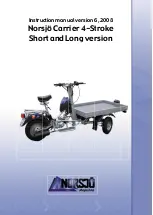
WARNING The reverse gear can be engaged only when the vehicle has come to a complete stop. With the engine
running, wait at least 2 seconds with the brake pedal completely depressed before engaging the reverse gear, in
order to avoid damaging the gears and clashing. In fig. 11 the brake adjuster is displayed which blocks the speed
change adjuster in combination with a sensor. A micro switch connected to the throttle pedal and notices the
minimal engine revolutions.
CAUTION!, The space under the pedals has to be free of obstacles: make sure that the mats are always well
spread out and do not impede the pedal's movement.
TIPPING BODY INSTRUCTIONS
Body tipping operations:
Lock the two body frame crosspieces that are located on the desired tipping side with the latches and
make sure that the hinge pins are properly fitted in place.
To lift the body, press the button (fig. 2 n° 6) towards the "lifting side".
The body moves upward only if the button is continually pressed. You can immediately stop tipping by releasing
the button.
CAUTION!
The tipping body must never be locked in diagonally opposing points; to avoid the wrong location the
latches are of different shape.
Only use original latches.
Before any lateral tipping make sure that the sides are open, act on lever fig.8.
Before beginning the tipping operations, make sure that the vehicle is located on horizontal and not soft
ground and that the load is uniformly distributed.
WARNINGS FOR THE TIPPING BODY USE
The three-sided tipping body is built and fitted with some devices in order to guarantee maximum safety, also for
an inexperienced driver; however, it is necessary to follow these fundamental safety rules:
Before beginning the tipping operations always make sure that the vehicle is located on a horizontal and
not soft ground and that the load is uniformly distributed.
Before beginning the tipping operations make sure that there are no people, animals or obstacles near the
vehicle.
Before beginning the tipping operations make sure that the latches are seated in order to allow tipping in
the desired direction.
While the tipping equipment is lifted or is being lifted, it is forbidden to get on the body for load levelling.
When the body is loaded, above all with loose material, pay maximum attention when opening the sides,
because the material's pressure makes the side open violently and the falling material could hit the
operator.
Make sure that during travel the sides are properly closed and locked (fig. 8).
Pay much attention, in case of tipping inside enclosed spaces, to the possible interference with beams,
ceilings, scaffoldings, installations, or other.
Never lift the body in the presence of electric cables or similar.
It is forbidden to leave the driving seat when the tipping equipment is lifted.
To activate the safety strut, the tipping equipment has to be empty.
During maintenance operations position safely the strut suited to support the body (fig.10). It is forbidden
to place any part of your body under the lifted body if the above-mentioned strut is not properly positioned.
When you unload laterally, check that the cable that prevents the ram from doing its full travel is in place
(fig. 10).
CAUTION!
1) Improper use of the tipping equipment is absolutely forbidden.
2) The working pressure of the hydraulic system is regulated by the constructor taking into consideration the
vehicle's capacity.
3) It is absolutely forbidden to change the calibration of the pressure control valve.
4) Never stay under the tipping body if it is lifted and if the strut is not properly fixed.
5) It is absolutely forbidden to travel with the body even slightly lifted.
6) Never lift the body laterally over the limit.
MATERIAL LOADING OPERATION
The load must be uniformly distributed, in order to avoid the danger of material falling off.
Never exceed the allowed load.
7
Summary of Contents for PK 600
Page 40: ...Comandi Fig 2 Comandi fig 1 1 2 3 4 5 6 7 8 9 10 11...
Page 43: ...Fig 3 Fig 4 Fig 5 Fig 6 Fig 7 Fig 8 C A B A B...
Page 44: ...Fig 9 Fig 10 Fig 11 Fig 12 Fig 13 Fig 14 B B A...
Page 45: ...Fig 15 Fig 16 Fig 17 Fig 18 Fig 19 Fig 20 B A A...
Page 46: ......
Page 47: ...Fig 21 Fig 22 Fig 25 Fig 26 Fig 23 Fig 24...
Page 48: ...Fig 28 Fig 30 Fig 31 Fig 28 Fig 26 Fig 27 A...
Page 49: ......
Page 50: ......
Page 52: ......










































